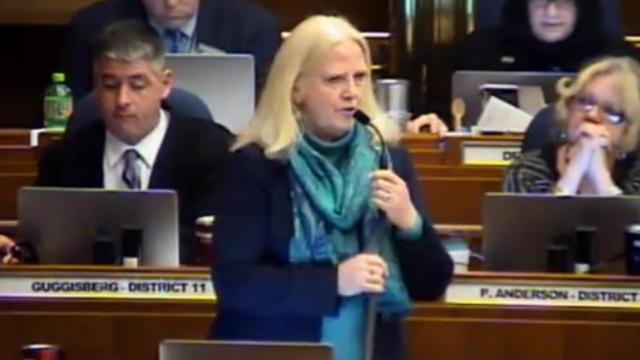Video: Democratic Lawmaker Says Raising Voter Fraud Penalty Is “Mean Spirited” and “Voter Intimidation”

After a federal court stuck down North Dakota’s voter ID law last year the state was forced to go back to an old system of letting people without valid ID’s cast their ballots using affidavits attesting to their identity. Today lawmakers took up HB1369 (see it below) which seeks to implement a more secure sort of ID requirement for voting while staying in line with what the federal courts have asked for.
Rep. Scott Louser (R-Minot) was the bill carrier and pointed out that the legislation still allows people to vote without proper ID, only their ballots aren’t counted until they can prove their identity with valid ID. Their ballots are set aside. Those casting them have until ballots are canvassed to get their ID’s to the proper officials. Among other changes, the legislation also raises the penalty for intentional voter fraud to a Class C Felony.
He also pointed out during his comments that affidavits used to cast ballots in the 2016 election were still being verified by the state’s counties which may never finish the process. The number of ballots cast using affidavits was up 55 percent in 2016.
That seems like a fairly obvious problem, but a Democratic lawmaker suggested that the Republican lawmakers behind the bill were just being mean.
[fcc_jw_player key=”pYImClNN”]
“We don’t have a voter fraud problem in North Dakota,” Rep. Mary Schneider, a Democrat from Fargo, said during the floor debate. “We have never had a voter fraud problem.” She went on to say that raising the penalty for voter fraud to a felony is “mean spirited” and “voter intimidation.”
But Rep. Chris Olson, a Republican from West Fargo, laid out some data to suggest otherwise. He told his fellow lawmakers that Cass County was still working on verifying affidavits used to cast ballots in last year’s election, and that among the thousands of affidavits found they found numerous problems including 86 Minnesota addresses, 2 Wisconsin addresses, 102 affidavits “returned underliberable”, and 5 people who denied having executed an affidavit to vote.
“If this isn’t a problem I don’t know what is,” he said.
He also pointed out that someone intimidated by the penalty for voter fraud is probably…someone intent on committing voter fraud.
Schneider suggested in her floor comments that this new legislation still doesn’t address the issues raised by the federal courts, but Rep. Jim Kasper (R-Fargo) said they specifically crafted the bill to address those concerns. “This bill does a good job of that,” he said.
Rep. Boehning (R-Fargo) said the felony penalty for voter fraud is “the same penalty as federal law.”
He also said he expects there to be some “prosecutions coming up here in the near future” for voter fraud from the last election.
The bill passed on a 74-16 vote.
[scribd id=338254532 key=key-FFH3SjZJ00cI9lnzFCqp mode=scroll]




